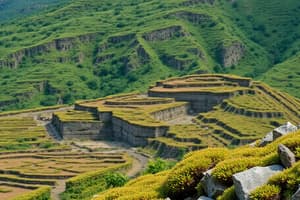Podcast
Questions and Answers
Explain the difference between static electricity and current electricity.
Explain the difference between static electricity and current electricity.
Static electricity involves stationary charges, whereas current electricity refers to the flow of electric charges through a conductor.
What is the main process by which plants convert sunlight into energy?
What is the main process by which plants convert sunlight into energy?
Plants convert sunlight into energy through photosynthesis, which involves using light energy to transform carbon dioxide and water into glucose and oxygen.
Describe how energy transfer occurs in a simple electrical circuit.
Describe how energy transfer occurs in a simple electrical circuit.
In a simple electrical circuit, energy is transferred from the power source to the components, allowing them to function through the movement of electrons.
How do series circuits differ from parallel circuits in terms of energy distribution?
How do series circuits differ from parallel circuits in terms of energy distribution?
What role do microorganisms play in an ecosystem?
What role do microorganisms play in an ecosystem?
Flashcards are hidden until you start studying
Study Notes
Static Electricity
- Results from the imbalance of electric charges in objects, leading to phenomena such as static cling and electric shocks.
- Key concepts include charge transfer, friction, and conductive vs. insulative materials.
Energy Transfer in the Electrical System
- Involves the movement of electrical energy through conductors, typically via electrical currents.
- Key components include voltage, current, resistance, and power, expressed in watts.
- Energy can be transformed into other forms, e.g. thermal or mechanical energy in appliances.
Series and Parallel Circuits
- In series circuits, components are arranged in a single path; if one fails, the entire circuit stops functioning.
- Parallel circuits provide multiple pathways for current flow; if one component fails, others continue to operate.
- Key formulas include total resistance in series (R_total = R1 + R2 + ...) and in parallel (1/R_total = 1/R1 + 1/R2 + ...).
Photosynthesis and Respiration
- Photosynthesis occurs in plants, converting light energy into chemical energy, producing glucose and oxygen from carbon dioxide and water.
- Cellular respiration is the process by which organisms convert glucose and oxygen into energy (ATP), producing carbon dioxide and water.
- Both processes are critical for the energy flow in ecosystems, representing the conversion of energy forms.
Variation
- Refers to the differences among individuals in a population, which can be genetic (heritable) or environmental (non-heritable).
- Key to evolution and natural selection; populations with greater diversity can adapt more readily to environmental changes.
Ecosystem
- Comprises living organisms interacting with each other and with their physical environment.
- Key components include producers (plants), consumers (animals), and decomposers (fungi and bacteria).
- Energy flows through ecosystems via food chains and food webs, highlighting the interconnectedness of organisms.
Microorganisms
- Includes bacteria, viruses, fungi, and protozoa, often too small to be seen without a microscope.
- Play essential roles in nutrient cycling, decomposition, and can form mutualistic relationships with larger organisms.
- Can have both beneficial (e.g., gut flora) and harmful effects (e.g., pathogens causing diseases).
Studying That Suits You
Use AI to generate personalized quizzes and flashcards to suit your learning preferences.




